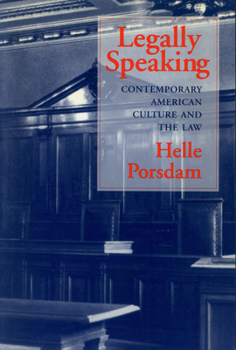Legally Speaking: Contemporary American Culture and the Law
Since the founding of the republic, the law has come to make itself felt at every level of American society. Indeed, as Helle Porsdam argues, in a country with no monarchy or hereditary aristocracy and no established church, the law has become America's "civil religion," helping to form a collective national identity. According to Porsdam, what is distinctive about the role of law in the United States is not simply the prevalence of legal language and practice in everyday life, nor the fact that people go to court more often on more matters than do citizens of other countries. It is that Americans appeal to the law with a singular faith and hope deeply rooted in the culture. For all their complaints about excessive ligitiousness, greedy lawyers, and the shortcomings of the adversarial system, when conflicts occur, it is to jurists rather than to politicians or the clergy that Americans turn in their search for solutions. To demonstrate how thoroughly the ideal of law permeates American life, Porsdam looks at a wide variety of cultural evidence, from the novels of Scott Turow and Sara Paretsky to the television show "The People's Court." In each case she unveils and explores telling links between culture, self, and society--all forged by the law.
Format:Paperback
Language:English
ISBN:1558492089
ISBN13:9781558492080
Release Date:July 1999
Publisher:University of Massachusetts Press
Length:240 Pages
Weight:1.00 lbs.
Dimensions:0.8" x 6.0" x 8.9"
Grade Range:Postsecondary and higher














